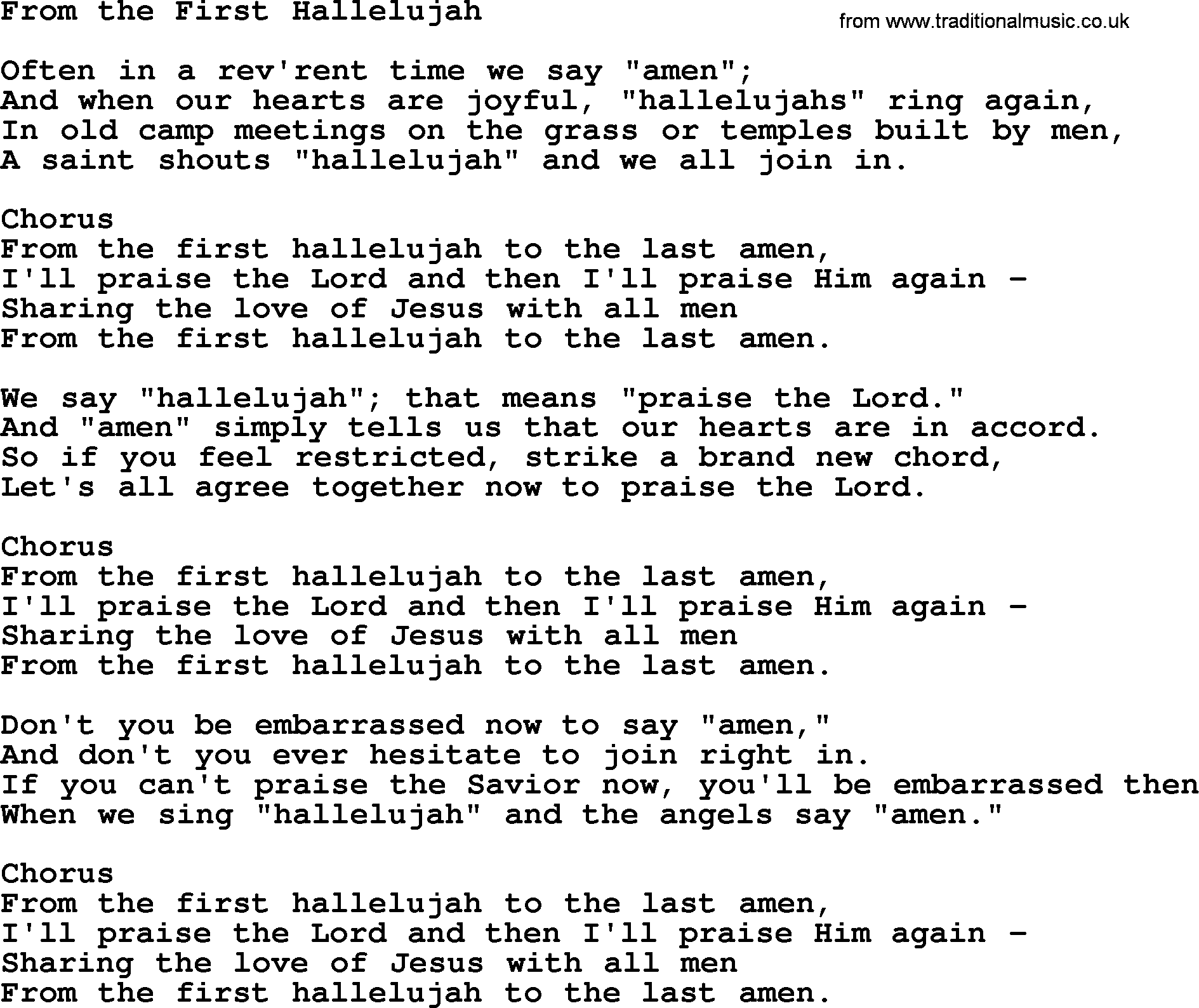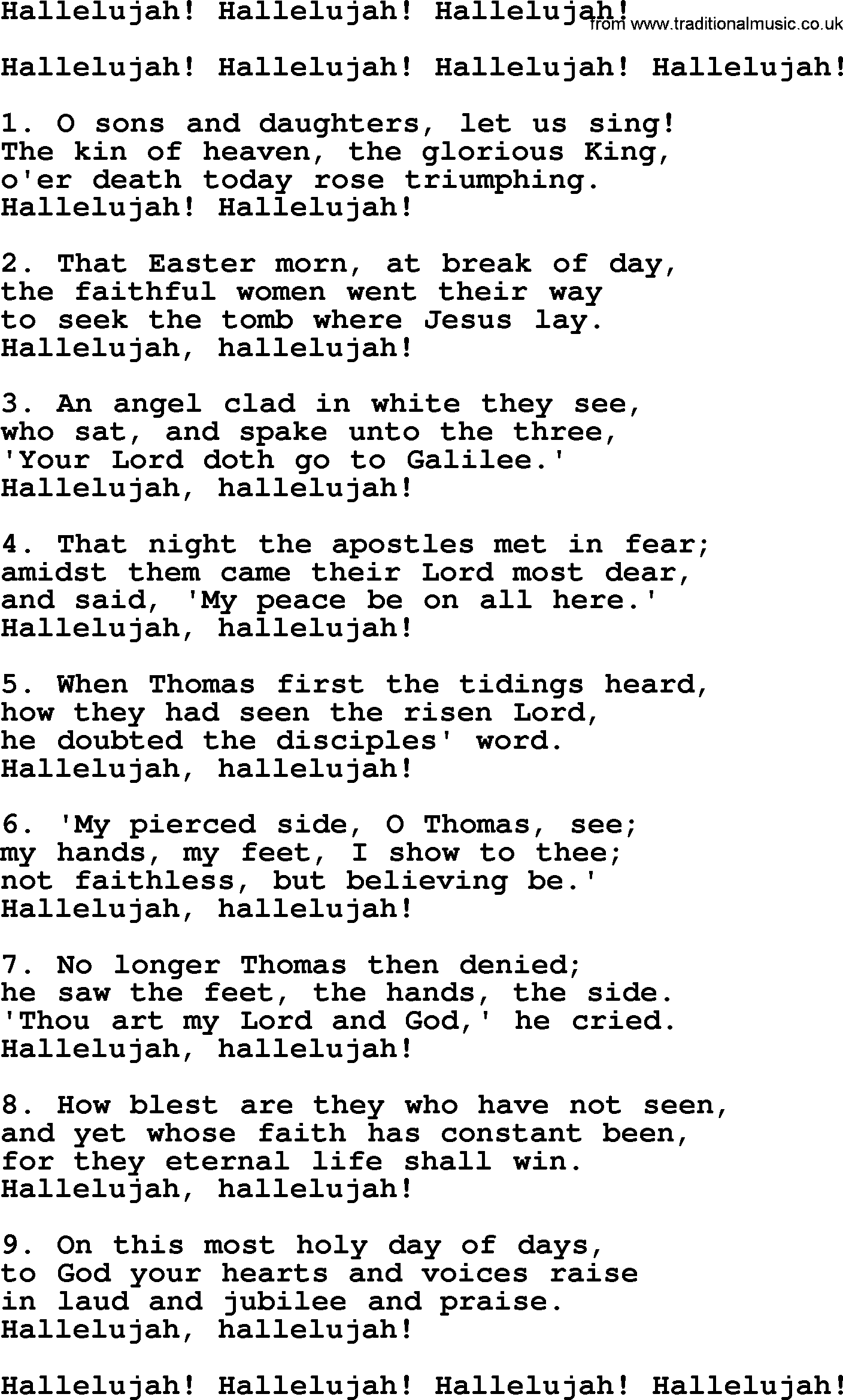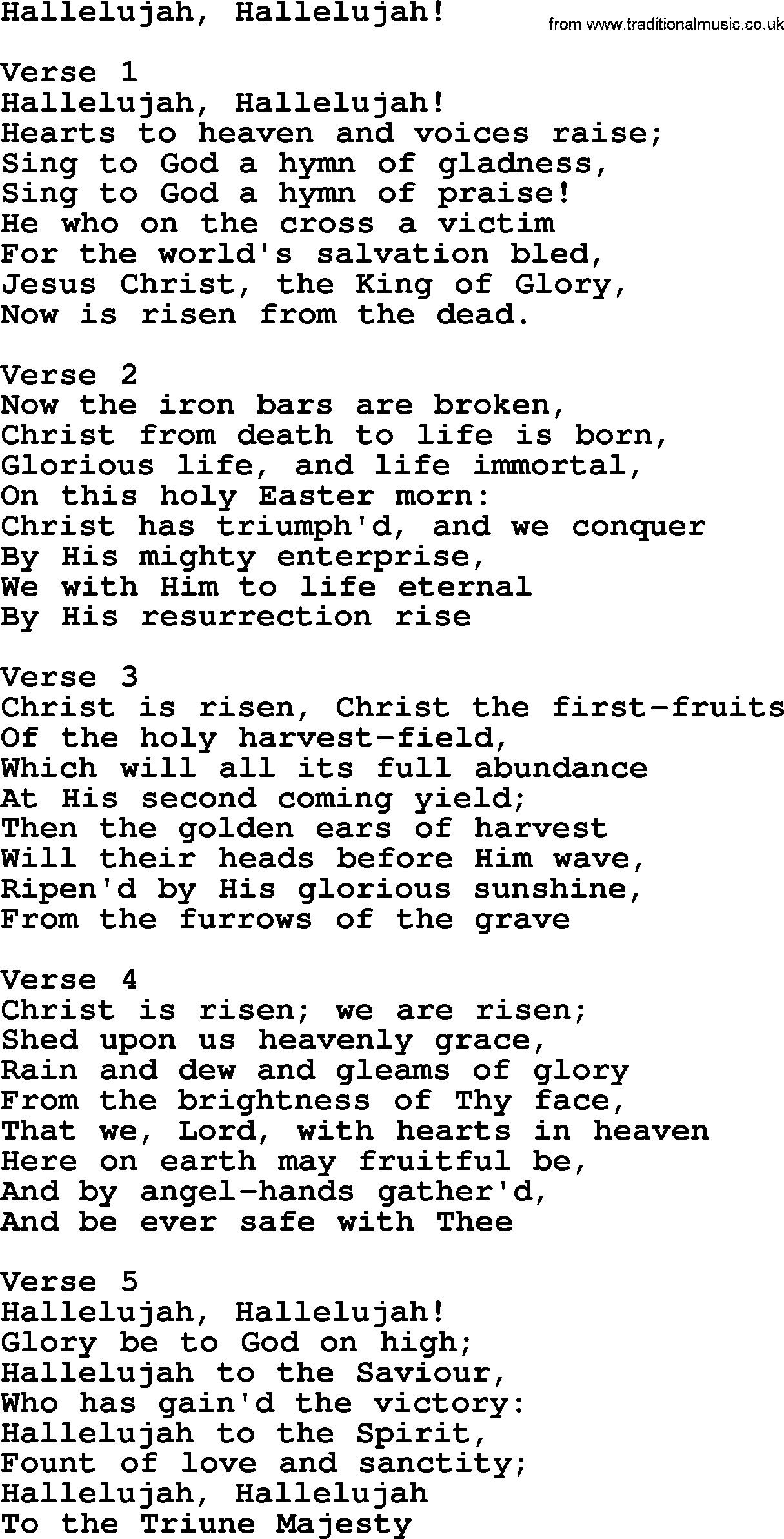Hallelujah Lyrics - Unraveling A Beloved Song's Core
The song "Hallelujah" has, in a way, become a global anthem, a piece of music that seems to resonate with just about everyone who hears it. Its melody, for instance, has a way of staying with you, long after the final notes fade. This tune, you see, has found its way into countless homes, across many different stages, and truly, into the hearts of people from all walks of life.
Yet, what many people find themselves wondering about, is that the words to this widely loved piece of music are not always the same. It's a bit like a living thing, you know, shifting and changing over time, depending on who is performing it or perhaps, which recording you happen to be listening to. This means that if you've heard a few different versions, it's quite possible you've encountered a few different sets of lines, too.
So, we're going to take a closer look at the actual words that make up this song, exploring how they have changed and what they might mean. We will, for instance, consider some of the different interpretations and the stories that these particular lines might be telling us. It's a rather interesting journey into the heart of a truly special musical creation, that.
Table of Contents
- Leonard Cohen - The Song's Originator
- Personal Details of the Song's Creator
- What Makes the Lyrics to Hallelujah Change So Much?
- Unpacking the Many Versions of Hallelujah Lyrics
- How Do the Lyrics to Hallelujah Connect to Ancient Stories?
- The David and Bathsheba Narrative in Hallelujah Lyrics
- Is There a True "Hallelujah"?
- The "Cold and Broken" Hallelujah Lyrics - What Do They Mean?
Leonard Cohen - The Song's Originator
When we talk about "Hallelujah," it's almost impossible not to think about the person who first brought it into the world. This song, you see, comes from the mind of a truly gifted wordsmith and musician, someone whose creations often invited listeners to consider deeper thoughts. He was a figure who, in some respects, had a unique way of looking at the world, and his work often reflected that particular viewpoint.
His way of writing, for instance, had a certain depth to it, a quality that made you want to listen closely to every word. He had a reputation for crafting pieces that were not just catchy tunes, but rather, works that had a lot of meaning packed into them. This particular song, "Hallelujah," stands as a very good example of his skill in this area, too.
It's interesting, how a creator's personal experiences can often find their way into their art, shaping the messages they wish to convey. For this particular song, it seems that later versions of the words began to reflect something quite personal about the person who wrote them. His way of finding peace or coming to terms with things, you know, was very much his own, and this comes through in the song's lines, apparently.
Personal Details of the Song's Creator
| Name | Leonard Cohen |
| Primary Roles | Songwriter, Poet, Novelist |
| Notable Creation | "Hallelujah" |
| Style of Work | Often reflective, deeply thoughtful, with a focus on human experience |
What Makes the Lyrics to Hallelujah Change So Much?
It's a bit curious, isn't it, how the words to a song can shift and take on new forms over time? For "Hallelujah," this is very much the case. You might hear one set of lines in a studio recording, and then, perhaps, a completely different set when someone performs it live. This variety is, in a way, part of what makes the song so special, allowing it to adapt and grow, almost like a story that keeps getting retold with new details.
There are, you know, whispers and stories about just how many different sets of words exist for this song. Some say there are a great many, far more than you might expect for a single piece of music. This means that when you hear a version by someone like Jeff Buckley, or perhaps a recording of the song's creator performing it live, you are very likely to come across lines that are not in other versions you've heard. It's quite a unique thing, actually.
This shifting nature of the words is not something you see with every popular song. It speaks to the song's ability to be a kind of vessel, holding different meanings and emotions depending on the moment or the performer. It's almost as if the song itself invites these changes, allowing it to remain fresh and relevant through many different times and situations, too.
Unpacking the Many Versions of Hallelujah Lyrics
One of the fascinating things about the words to "Hallelujah" is how they seem to multiply. You'll find that the original creator himself would often change the lines when he performed it for an audience. And then, when other artists took up the song, they, too, would sometimes add their own twists or choose different sets of lines from the many available. This makes for a rather rich collection of versions, in some respects.
For instance, there are specific lines that are often heard in live performances by the song's creator, and these are the ones that artists like Jeff Buckley also picked up and used. These additional lines, you see, add new layers to the song's overall message, giving listeners more to consider. It's a bit like finding extra pages in a book you thought you knew well, which is quite interesting.
The existence of so many different versions of the words means that the song is, in a way, constantly being reinterpreted. It's not a fixed piece, but something that breathes and changes, allowing it to connect with new listeners in new ways. This fluidity is, perhaps, one of the reasons why the song has remained so popular for such a long time, too, because it never truly gets old or predictable.
How Do the Lyrics to Hallelujah Connect to Ancient Stories?
When you listen closely to some of the specific lines in "Hallelujah," you might notice that they seem to pull from very old tales. This connection to ancient stories is, in fact, a key part of what gives the song its deep resonance. It's not just about modern feelings; it also taps into narratives that have been around for a very long time, stories that many people are familiar with, too.
One particular part of the words, for example, clearly brings to mind a story from a very old religious text. It talks about someone whose strong belief was present, but they also needed some kind of proof. Then, it describes seeing a person bathing on a rooftop, and how that person's beauty, along with the moon's glow, completely captivated the observer. This set of lines, you know, paints a very vivid picture.
This particular section of the words, in some respects, points directly to the story of King David and Bathsheba. This tale, from the Old Testament, is about desire, power, and human weakness. It's quite a powerful story, and its presence in the song's words adds a layer of meaning that goes beyond a simple tune. It makes the song feel, perhaps, more significant, too.
The David and Bathsheba Narrative in Hallelujah Lyrics
The first part of the words to "Hallelujah" very clearly refers to the story of David and Bathsheba. This ancient tale, you see, starts with David playing music, which apparently brought joy to the divine. But then, the song takes a different turn, suggesting that David's "hallelujah" was not simply a shout of praise to a higher power. Instead, it came from a very human experience.
The lines suggest that David's "hallelujah" was a result of an intimate moment, specifically, making love to Bathsheba. The song says that from her lips, he drew the feeling of "hallelujah." This interpretation, you know, shifts the meaning of the word from a purely religious exclamation to something that is tied to human connection and desire. It's quite a bold way to look at it, actually.
This particular connection to the David and Bathsheba story is quite important for understanding the song's deeper messages. It shows how the song explores the intersection of the sacred and the human, suggesting that moments of profound human experience can also lead to a kind of "hallelujah." It's a way of saying that even in our most human and sometimes flawed moments, there can still be a sense of wonder or profound feeling, too.
It's also worth noting that there was a discussion online, back in 2008, about whether the words to this song had been put into Spanish. Someone named "gingermop" posted about "Hallelujah lyrics" and another person, "chimis," wondered if the song had been translated. This shows, you know, how much people want to connect with the song, even across different languages. The lines themselves, as written, are generally seen as correct, which is good.
Is There a True "Hallelujah"?
Given all the different versions and interpretations, one might wonder if there's a single, true meaning to the word "hallelujah" within this song. The song itself, you see, seems to suggest that the most genuine expressions of "hallelujah" are, by their very nature, not perfect or shiny. They are, perhaps, a bit rough around the edges, even a little bit broken or not quite enough. This is a rather interesting idea, isn't it?
It implies that the "hallelujah" that truly matters comes from a place of real life experience, which often includes struggle and imperfection. It's not about a flawless moment of pure joy, but rather, something that comes from acknowledging the difficulties and shortcomings. This perspective, in some respects, makes the song even more relatable to many people, because life is rarely perfect, too.
The song seems to tell us that even when our expressions of joy or wonder feel a bit "cold and broken," or when they seem to fall short, we are still asked to sing them. We are, you know, encouraged to give voice to these feelings anyway, despite their imperfections. This idea is quite powerful, suggesting that there is value in expressing ourselves honestly, even when things are not ideal.
The "Cold and Broken" Hallelujah Lyrics - What Do They Mean?
The concept of a "cold and broken" hallelujah is, perhaps, one of the most thought-provoking parts of the song's words. It challenges the common idea that "hallelujah" must always be a shout of pure, unblemished happiness or praise. Instead, it suggests that there's a kind of truth in the less perfect, more difficult moments of life, too.
These lines imply that our most honest expressions of feeling, even those that come from a place of pain or sadness, can still be a form of "hallelujah." It's a way of saying that life's struggles and disappointments are just as much a part of the human experience as its joys. And, in a way, acknowledging these tougher parts can lead to a deeper, more genuine feeling of wonder or acceptance.
So, the song is, perhaps, inviting us to find the "hallelujah" in everything, even in the things that are not what we might expect. It's a call to embrace the full spectrum of human feeling and experience, recognizing that even in moments of weakness or imperfection, there can still be a profound sense of connection or understanding. This is, very much, a core message of the song's enduring appeal, too.

Hallelujah Lyrics

Hallelujah Lyrics Printable

Hallelujah Lyrics Printable